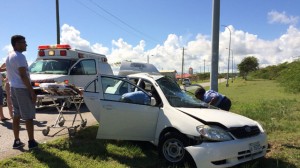 WASHINGTON, DC, USA (CMC) — The Pan American Health Organization (PAHO) says more needs to be done in the Americas, including the Caribbean, to address traffic management as this is the key to saving lives and making cities more livable.PAHO noted that 17 countries in the Americas have already set maximum speed limits of less than 50 km/h in urban areas, “which conform to best practices”, adding that three countries have given local authorities leeway to reduce the limits further.
WASHINGTON, DC, USA (CMC) — The Pan American Health Organization (PAHO) says more needs to be done in the Americas, including the Caribbean, to address traffic management as this is the key to saving lives and making cities more livable.PAHO noted that 17 countries in the Americas have already set maximum speed limits of less than 50 km/h in urban areas, “which conform to best practices”, adding that three countries have given local authorities leeway to reduce the limits further.
“Control at the local level is important, so lower speed limits can be set in populated or vulnerable areas such as those near schools or health facilities,” PAHO said. “However, laws on speed limits must be accompanied by strict compliance, so that they are effective and thus save lives.”
Only one country in the Americas describes its compliance with these laws as “good”, according to a PAHO report on Road Safety in the Region of the Americas.
“The region of the Americas has made progress in adopting standards that limit speed in urban areas, but it needs to further strengthen the application of these standards to reduce deaths and injuries due to traffic,” said Eugenia Rodriguez, PAHO’s regional advisor on road safety.
He said speed management measures include building or modifying roads to include features that slow traffic, such as roundabouts and speed bumps; establishing speed limits appropriate to the function of each road; and enforcing speed limits through the use of manual and automated controls.
Additionally, Rodriquez said speed management measures comprise installing in-vehicle technologies in new cars, such as intelligent speed assistance and autonomous emergency braking; and raising awareness about the dangers of speed.
Managing speed was released in advance of the Fourth UN Global Road Safety Week, which starts today.
The week and its related campaign “Save Lives: #SlowDown” will draw attention to the dangers of speed and the measures which should be put in place to address this leading risk for road traffic deaths and injuries, PAHO said.
It said more than 20 countries in the Americas are carrying out information and awareness activities for decision-makers and authorities of traffic-regulating institutions, as well as for the general public.
Activities include dissemination of messages in media and social networks, transport systems and schools.
Road safety fairs, caravans, presentations in public places, signage work in urban areas, and promotion of commitments by local authorities to reduce speed limits are also being held, PAHO said.
Among hundreds of other events, PAHO said “Slow Down Days” are being held in Colombia and Trinidad and Tobago, campaigns around schools are being held in Brazil, and parliamentarians are involved in activities in several countries.
PAHO said Road Safety Week is a “unique opportunity for advocacy on this theme, which contributes to achievement of the road safety-related Sustainable Development Goal targets 3.6 and 11.2”.
A new report is also scheduled for release during this week: Save LIVES: a road safety technical package, which details 22 key evidence-based measures considered most likely to impact on road traffic deaths and injuries, including a number linked to managing speed.
